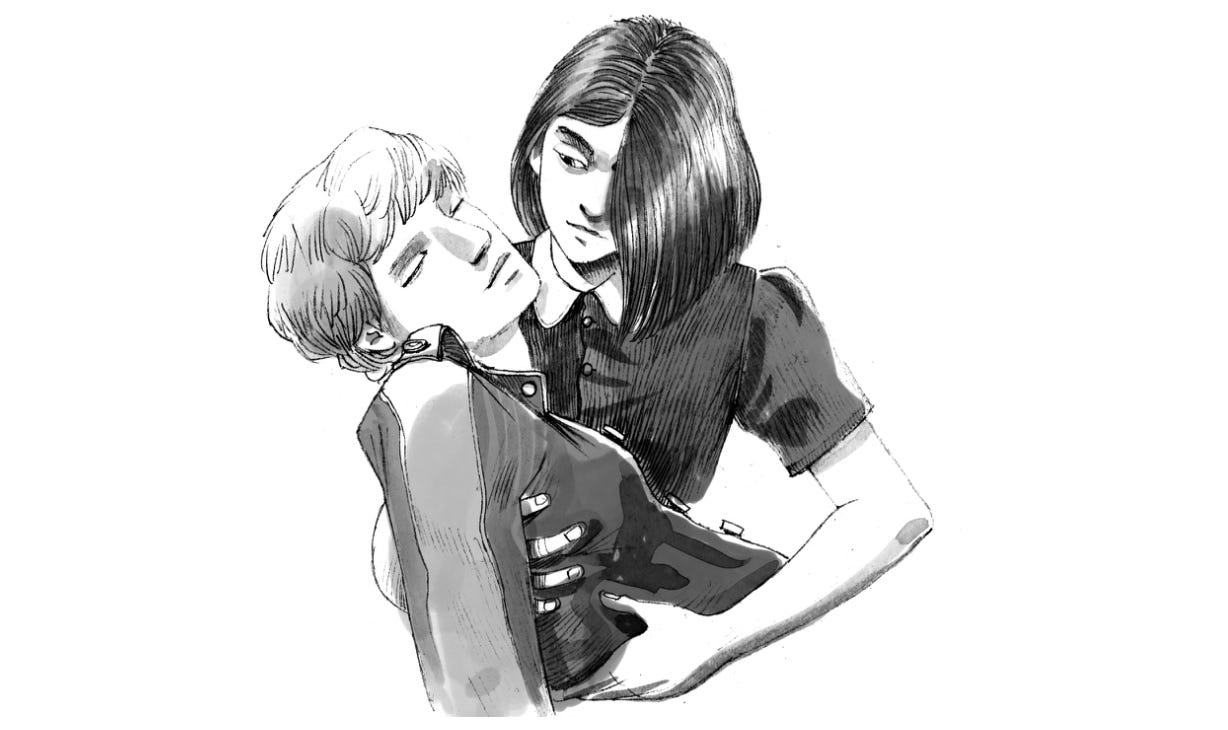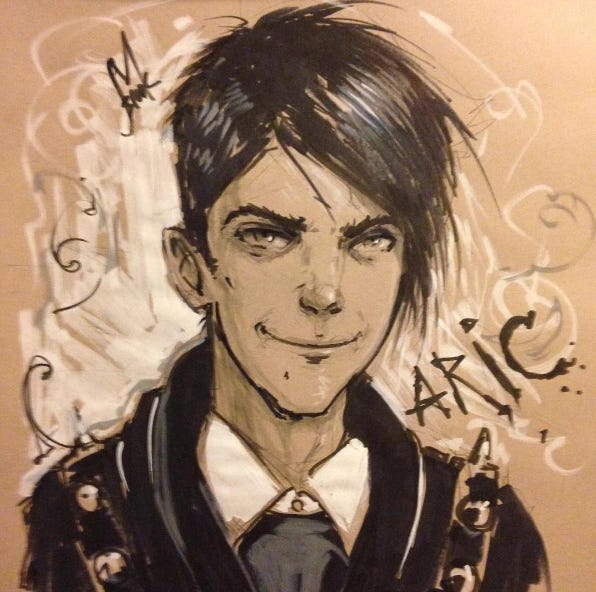For the 8 years of writing The School for Good and Evil, I flourished in a female headspace.
The six novels in the series are unabashedly a female fantasy, where men suffer the same objectification that women do in real life, and all the tables are turned. Tedros and his princely counterparts are most often the damsels in distress, and Agatha and Sophie are the bold, swashbuckling heroes who can slay the beast while also looking glamorous and talking about their feelings, inhabiting all the multitudes of feminine magic.
People are often shocked that the author of the books is a man, which I find surprising, because writing girls and women who are full of ambition and passion and doubt and who are at once transparent and mysterious and strong and vulnerable is just the most natural thing in the world because this is how women are.
It’s writing boys and men that is the challenge.
Almost an impossible one.
Young World is a crucible for it.
The book is the diary of a 17 year-old boy, and in early drafts, back in 2023, I let him rip with his feelings. It is a diary, after all. Let him be his full, horny, overwrought, nakedly emotional self. In terms of defining his headspace, I wrote him the way I would Sophie or Agatha — ruthlessly honest, no-holds-barred, just pure id and intensity.
But with early drafts came early feedback.
That my hero, whose journey relies entirely on a complicated romance with a girl, seemed…
…not into girls.
Huh?
I stood on my figurative mountaintop and screamed at the sky: WHY?
Because he’s so emotional, I was told. And he talks about girls so honestly and vulnerably — about their personalities, not his physical attraction to them — that it suggests he’s actually not attracted to them.
This went over with me like a rat at a garden party.
I’d written Tedros this way in The School for Good and Evil and no one doubted his love for girls. He was florid and extravagant in his emotions, but also desperate and angry and contradictory. He was every much as emotional as all the girls in the novels, sometimes even more. And him liking girls was never in question. Yes, some thought he liked boys too — particularly since he kissed one in Book 2 — but he was a sturdy, masculine prince who girls loved and boys wanted to be.
Except that was a fantasy novel, and Young World is a book set in the real world. The rules are different, it turns out.
In fact, readers, particularly female ones, are willing to put up with all kinds of things from male characters in fantasy books that they won’t in contemporary ones. (Aric, for instance, in The School for Good and Evil is the most toxic male alive – and still gets more fan mail than any other character. In a contemporary novel, he wouldn’t just be reviled, but protested.)
Still, I thought the bridge between fantasy and real-life could be connected. Indeed, I’d written my hero in Young World the same way I’d written a prince, thinking: isn’t this the kind of boy a girl wants in the real world? The kind of boy everyone wants to read about? One who is open-hearted and 100% his real self?
No. Not in the real world. Their sexuality comes into doubt. Or at least it did for the handful of first readers.
So I went back to work.
Expunging the ghosts of fantasy. Trying to dig deeper into his teenage lust.
Months later, after revisions, I handed it back to the readers. With one single directive — Is he reading as genuinely attracted to women?
“Mmm, actually…” the response came. Long pause. “He seems to objectify women a lot. Kinda aggressively hetero. Not sure that’s what you want either.”
Back to the mountain to scream.
What to do? Up in fantasy land, I could write my own rules. Down here on the ground, there are labels waiting for me. Write a boy that’s emotional and he’s gay. Write a boy that talks about girls and he’s an asshole. I wasn’t getting the balance right and it was most certainly me that was the issue, because John Green and a thousand other contemporary authors get it right while I flounder in the pendulum of Homo/Hetero.
That’s when I took a break for a little while and let my subconscious do the work.
The novel itself was working like a dream. The story, the conflict, the energy, the idea and heart and core of it. Everything was there. Only one piece missing: the authenticity of how a 17 year-old teenage boy expresses his romantic self.
So I started paying more attention to the teenager boys in my own life — my partner has 7 nephews between the ages of 14 and 22, which meant a whole lot of research material. And the one thing I noticed is how deeply they feel when it comes to romance, but how little language they have for it. They can talk about everything, everything… except girls.
Ah. Lightbulb.
Recently, then, I went through the novel and simply pared away a lot of the language around how my hero sees girls. Before, I was adding in order to address anxieties over his sexuality. Now, I was subtracting. Just stripping it to pulse and energy. He can be led by his id, I told myself. He just can’t describe it.
In many ways, counterintuitively, I was making the character more Me. Him so awed by girls that in not being able to talk clearly about them, he captures his admiration of them. His absolute love of everything about what makes a girl a girl. And why they’re often so much more capable than a man. The same feeling that infuses all my work.
Instead of trying to capture a boy, I simply let him be one.
It wasn’t a lot of change. In a book of 125,000 words, I changed less than 200 of them. Not even 0.2%. Hardly anything statistically.
And yet, the book transformed.
He became softer, more dimensional, more real. The romance untethered from lust and started to soar. You relate to him because he has the feeling, just not the words, even if he has the words for everything else, and that doesn’t just describe teenage boys, it describes most of us when it comes to love and the language of the heart.
When I closed the book, likely for the final time, I felt this huge sense of relief. I’d found my way down from celestial fantasy to the grounded earth of the real world. And in the process, I’d gotten away from Homo/Hetero and all the internal drama of how to write a boy and simply written an authentic soul, struggling with romance, gently stripped down to confusion and questions, instead of trying to have all the answers.
Subtract, not Add.
It’s the secret to writing boys, it turns out.
Your turn.
What strikes you when you read or write male characters?
Until next week —












And also Soman thank you for these journals and for listening to your fans. I loved meeting you in Chicago and giving you some sample of my writing as well along with the dreamcatcher
I'm not making this up, but what strikes me when reading male characters is your writing, Soman. Gosh, read A World Without Princes nine years ago and fell for Aric, then subsequently fell for Japeth etc as the following books came out. To this day I'm still incapable of liking another male character as much as I like your villains. There's just this way you write that's not like anything else(in the best way, of course)...You have nooo idea how it hits me, the aura/ambience you've created for every character. I really want to say thank you for writing these characters I really, really love <3, even if you don't get why people like them(I don't get myself either lol).